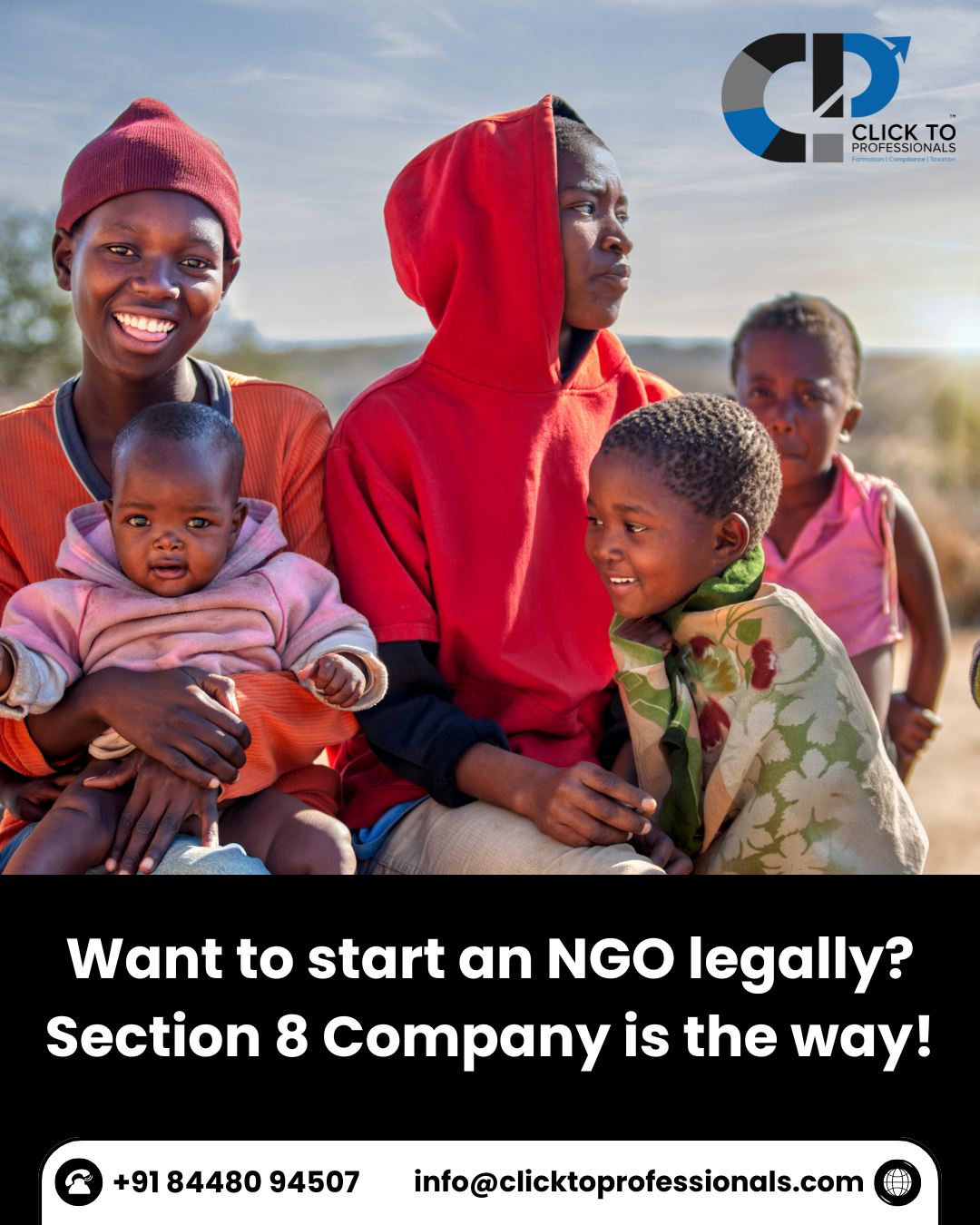
Are you starting a nonprofit in India? You may have heard the phrase “Section 8 Company Registration.” But what does it really mean? What good does it do for your organization or NGO? And why do so many philanthropic groups like this structure?
In this blog, we’ll talk about what Section 8 business Registration is, why it’s great for NGOs, and how to form a Section 8 business and file for 80G registration to get advantages for your Section 8 company. This handbook is easy to read so that anybody who wants to work in social work or charity may grasp it and feel good about what they do.
What does it mean to register a Section 8 company?
The Companies Act, 2013 in India says that Section 8 Company Registration is a procedure. A Section 8 firm is a nonprofit group that works to help others by doing things like:
- Learning
- Culture and art
- Protecting the environment
- Welfare for everyone
- Athletics
- Research and development
The main distinction between this and other corporations is that Section 8 firm Registration lets a firm function without making money. Any money or profit it makes may only be utilized to further its goals and cannot be shared with its members.
Why is it best for NGOs to register as Section 8 companies?
A lot of NGOs in India decide to incorporate as a Section 8 corporation since it has a lot of benefits. Let’s talk about why this structure is great for companies that want to make a difference in the world:
1. Trust and Legal Recognition
An NGO becomes lawful when it registers as a Section 8 Company. People who provide money, the government, and other groups are more inclined to trust and help a registered organization.
2. Tax Breaks
You may get 80G registration for your Section 8 business once you register it. This lets donors claim tax deductions. The corporation might potentially ask for a 12A exemption to avoid paying income tax.
3. Limited Liability
Members and founders are only partially responsible. This implies that their personal property is safe even if the company runs into money problems.
4. Always Following
An NGO with a Section 8 corporation may keep going even if the original founders depart, which makes sure that it will be there for a long time.
5. More Trustworthiness for Fundraising
Most international funders and government programs will only work with your NGO if it is registered as a Section 8 Company. This makes it more likely that you will get grants and money.
How to Register a Section 8 Company in Steps
If you think this is the perfect model for your NGO, here’s how to start the process of registering a section 8 corporation in India:
Step 1: Get a DSC, or Digital Signature Certificate.
Getting the Digital Signature Certificate for all the directors is the first step in registering a Section 8 Company.
Step 2: Get a Director Identification Number (DIN)
For a sec 8 business to be formed, each prospective director must have a DIN.
Step 3: Get the name approved
You need to choose a name that isn’t already used and then use the RUN (Reserve Unique Name) feature on the MCA site to apply. The name should show what your charity is trying to do.
Step 4: Write the Articles of Association and the Memorandum
In this phase, you write the most important legal papers that spell out your company’s mission, rules, and structure. These are necessary for registering a section 8 corporation.
Step 5: Submit Form INC-12 to get a license
To receive a license to register a Section 8 corporation, you need to fill out Form INC-12. This covers things like the MOA, AOA, financial accounts, and declarations.
Step 6: Send in the SPICe+ Form to start the process of incorporation.
You may use the SPICe+ form to set up a section 8 business when your license is authorized. This form has all the information it needs about the firm, its directors, and its address.
Step 7: Get a Certificate of Incorporation
The Registrar of Companies (ROC) will provide you a Certificate of Incorporation when they have checked everything out. You now have a legitimate NGO with a Section 8 Company Registration.
What papers do you need to sign up for a Section 8 company?
This is a list of the papers you need to register a section 8 company:
- PAN and Aadhaar numbers for all directors
- Pictures the size of a passport
- Proof of address (such a rent agreement or an energy bill)
- Letter of consent from all directors
- Drafts of the MOA and AOA
- Report on the project or goals of the NGO
- All papers should be unambiguous and signed by the person who wrote them.
After you register: You need to apply for 80G registration for your Section 8 company.
You should apply for 80G registration for your Section 8 firm as soon as your Section 8 Company Registration is done. This lets your donations take a tax break under Section 80G of the Income Tax Act.
The steps are as follows:
- Filing Form 10A or 10G online using the Income Tax Portal
- Sending in audited accounts
- Giving information about your philanthropic work
This stage offers a lot of value and makes your NGO more appealing to funders.
Frequently Asked Questions
Is registering a Section 8 company only for huge NGOs?
No. If small NGOs or social startups desire to act in a legal and professional fashion, they may register as a Section 8 corporation.
Do you have to get 80G registration for a Section 8 company?
It’s not required, but it’s a good idea. It helps bring in contributors who desire tax breaks.
Can people from other countries be directors of a Section 8 company?
Yes, but at least one director has to live in India.
Can corporations under Section 8 get contributions from outside the US?
Yes, however they need to sign up for the FCRA (Foreign Contribution Regulation Act).
Advantages of 80G Registration for Section 8 Company
Do you still want to know why it’s vital for a Section 8 firm to register for 80G? Here are the main benefits:
- Donors may get a tax break of up to 50% on their gifts.
- More openness
- Better chances to raise money
- Under CSR, it encourages businesses to provide money.
This is why NGOs hurry to get 80G registration for their Section 8 firm as soon as they start up.
Conclusion
If you really want to form a nonprofit or NGO registration in India, the easiest way to do so is to register as a Section 8 company. It has a solid legal basis, contributors can trust it, and the government backs it. When you add 80G registration for Section 8 corporation, your organization becomes even more appealing to donors.
Don’t put it off. Registering a Section 8 corporation now can help you make a better future for your goal, whether it’s to help people get an education, fight poverty, or protect the environment.
You may start a legally sound, effective, and long-lasting NGO that makes a difference by learning how the process works, getting the necessary papers, and applying for the right registrations.
Contact Us:
Call us at +91 84480 94507 or email us at info@clicktoprofessionals.com for any queries.
Choose Click To Professional – Your Partner in Business Success.
Additional insight here: What Documents Are Needed for ROC Annual Filing and How Should You Prepare Them?

